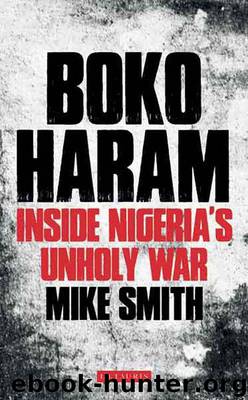Boko Haram: Inside Nigeria's Unholy War by Mike Smith

Author:Mike Smith
Language: eng
Format: mobi
Publisher: I.B.Tauris
Published: 2015-01-29T16:00:00+00:00
4
‘That Is How Complex the Situation Is’
The president, apparently attempting to comfort the nation, would end up doing something else entirely. It was January 2012, at the end of a Christmas season that had been so bloody it had led some to again question whether Nigeria was careening toward a second civil war. Boko Haram insurgents had changed tactics and targeted churches in an onslaught of bombings on Christmas Day. In the worst of the attacks, a suicide bomber drove up outside a Catholic church in Madalla, near the capital Abuja, as Christmas morning mass was ending and set off his explosives near the entrance. The force of the blast ripped through the crowd, a combination of churchgoers making their way outside, motorcycle taxi drivers and passersby, killing 44 people. Some who were badly injured ran to the priest for a final blessing. ‘It was really terrible’, Father Christopher Barde told my AFP colleague Ola Awoniyi. ‘People ran towards me, [saying] “Father anoint me.”’1
After at first issuing statements with the usual condemnations and promises to track down the masterminds, President Jonathan made two speeches on New Year’s Eve that would be his most forceful yet related to the insurgency. The first came as he visited the church in Madalla where the bomb attack had occurred. While there, he said Boko Haram ‘started as a harmless group [...] They have now grown cancerous. And Nigeria, being the body, they want to kill it. But nobody will allow them to do that.’2
On the heels of that visit, Jonathan would later in the day give a nationally televised address to announce he was declaring a state of emergency in areas hit particularly hard by the violence. ‘While the search for lasting solutions is ongoing, it has become imperative to take some decisive measures necessary to restore normalcy in the country especially within the affected communities’, he said.3 He provided few details on what exactly the declaration would mean on the ground, and as the days wore on, it seemed that little had actually changed. However, while the announcement may have been light on substance, it provided some relief in the country, since the government seemed to finally acknowledge the dangerous situation it was facing.
That relief would give way to more confusion only a few days later. On 8 January, Jonathan would give a speech that would have been extremely alarming had it not been so baffling. It occurred on Armed Forces Remembrance Day at the National Christian Centre, a cathedral-like structure in the capital Abuja, near the national mosque. It generated little interest beforehand, seeming to be one of the many functions and events a president shows up for, says a few words and departs. Jonathan seemed to speak off-the-cuff, ranging from the recent attacks on churches to corruption, but it was his comments about Boko Haram that were so startling. He suggested that the group had infiltrated the government and security forces, but in such vague terms no one knew what to make of it.
Download
This site does not store any files on its server. We only index and link to content provided by other sites. Please contact the content providers to delete copyright contents if any and email us, we'll remove relevant links or contents immediately.
| Arms Control | Diplomacy |
| Security | Trades & Tariffs |
| Treaties | African |
| Asian | Australian & Oceanian |
| Canadian | Caribbean & Latin American |
| European | Middle Eastern |
| Russian & Former Soviet Union |
The Secret History by Donna Tartt(16643)
The Social Justice Warrior Handbook by Lisa De Pasquale(11492)
Thirteen Reasons Why by Jay Asher(7796)
This Is How You Lose Her by Junot Diaz(5791)
Weapons of Math Destruction by Cathy O'Neil(5045)
Zero to One by Peter Thiel(4832)
The Myth of the Strong Leader by Archie Brown(4795)
Promise Me, Dad by Joe Biden(4452)
Beartown by Fredrik Backman(4427)
Stone's Rules by Roger Stone(4420)
How Democracies Die by Steven Levitsky & Daniel Ziblatt(4407)
The Fire Next Time by James Baldwin(4348)
100 Deadly Skills by Clint Emerson(4084)
A Higher Loyalty: Truth, Lies, and Leadership by James Comey(4038)
Rise and Kill First by Ronen Bergman(4016)
The David Icke Guide to the Global Conspiracy (and how to end it) by David Icke(3889)
The Farm by Tom Rob Smith(3878)
Secrecy World by Jake Bernstein(3787)
The Doomsday Machine by Daniel Ellsberg(3736)
